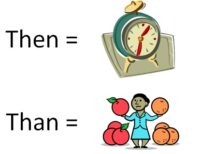Grammar-ease: Using ‘than’ and ‘then’
I’ve done quite a few double-takes in reading the past few months over two words that sound similar, look similar, yet have quite different meanings: than and then.
Than is used for comparisons; then is used for sequences in time.
For example, which term is correct in each of the following?
- I have a lot less office space than/then you.
- She was much skinnier back than/then.
- You reacted a lot more rationally than/then I would have.
- Pumpkins tend to be bigger than/then plums.
- Summer is later than/then spring.
(Answers: than, then, than, than, then)
Than is a comparison word.
- I would rather get outside than watch TV.
- Her reports are filled with more errors than mine.
- He prefers fresh flowers from his garden more than fancy arrangements from a florist.
- How about jogging rather than walking today?
- Twenty is much less than a thousand.
- Dogs need a lot more attention than cats.
Then refers to sequences in time. It tells when something happened.
- He rinsed the dishes, then dried them, and then put them away.
- Finish studying for your test, then you can go out to play.
- I booked my flight, then checked my calendar and found a conflict.
- Her son ran into the house with muddy shoes, then looked back and saw the mess.
- Boy meets girl, boy and girl fall in love, and then they live happily ever after.
- Until then, stay where you are.
A couple of tricks that may help:
- Remember the phrase “rather than,” as it emphasizes that ‘than’ is used to compare one thing to another. Or the phrase “and then and then and then” (which is a familiar way for kids to tell a story), and it can trigger ‘sequence’.
- “Then” relates to “time” (both words have an ‘e’). “Than” is a “comparison” (both words have an ‘a’).
Was this helpful? Search for these terms in your work-in-progress and see if you find any issues.

